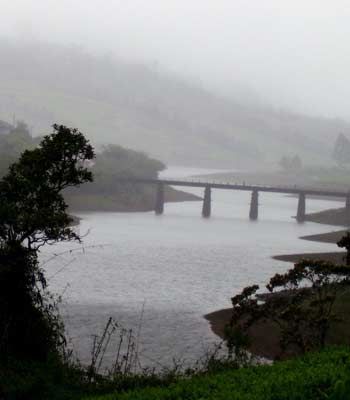We are all ‘Chasing the Monsoon’, notes Ajit Balakishnan.
 The skies over Mumbai, as I write this, are dark and foreboding.
The skies over Mumbai, as I write this, are dark and foreboding.
There is a sense that something is about to happen. Mumbai harbour, sprawled in front of me, is not its usual busy scene.
The usual multitude of tiny fishing boats waiting in queue to offload their catch at Sasoon Docks are not to be seen; they must all have pulled ashore at one of the innumerable little fishing villages that surround Mumbai.
I glance at the news headlines streaming through on my smartphone: India’s economy in the quarter-year ended March grew 7.5 per cent over the previous quarter, making it the fastest growing economy in the world.
The United States, for the same period, contracted its economy 0.7 per cent and Portugal 0.4 per cent.
I note Portugal because if I could transport myself back 513 years ago, it was on a May day like this that two sailing ships appeared over the horizon.
In one was Vasco da Gama who, after a year-long voyage from Lisbon down the eastern part of the African coast and up the western coast and then, capitalising on the strong monsoon winds blowing eastward towards India, took the giant leap across the Indian Ocean to land in India.
Could anyone living at that time have foretold the epochal nature of change that the monsoon of 1498 would bring to India?
Word of Vasco having discovered the land route to Malabar and its riches caused great excitement in Europe; every self-respecting European monarch enjoined his merchant-warriors to set forth in Vasco’s path.
Again, who would have guessed that all this would lead to a tiny European island-country, England, imposing its will and ruling over India, a country many times its size in area and population, for the next couple of hundred years?
The monsoon not arriving can also create epochal changes.
It was a series of monsoon failures and the spectre of mass famine that forced India to adopt new technology in the form of new varieties of wheat and rice seeds that transformed India from a country of perennial famines one that supplies rice to the world.
The ‘Green Revolution’ and its technological package of high-yielding seeds, chemical fertilisers and pesticides, tube wells, diesel pump sets and tractors, increased yields of rice, for example from two tonnes per hectare to six tonnes per hectare.
“Why do some societies choose institutions and policies that block technological and economic progress?” asks Professor Darian Acemoglu in his classic economics textbook, Introduction to Economic Growth.
His answer, at the end of a textbook filled with mathematical models which imply a complete certitude about how economic models work, is that real insights about why economic growth happens lie in political economy and that the political economy of growth is in its infancy and that we need to investigate why societies make different collective choices to really understand the process of economic growth.
For example, if consumer e-commerce expands a lot in India, a whole class of national, regional and local distributors will see their fortunes plummet but another whole set of e-commerce entrepreneurs and the investors behind them would prosper.
Stripping off the multiple levels of these distributors would result in a more efficient distribution system which in turn will lead to lower prices for consumers. But these entities who we see in abstraction as ‘distributors’ are powerful people in Indian society.
In any Indian small town, these very distributors are often the president of the local Rotary Club, the chairman of the local chamber of commerce, the financial hand behind many a political party.
They may even be former landlords, the children (or he himself) go to posh public schools.
He is not going to give up without a fight. Social conflict is thus inevitable with any kind of economic and technological change.
Those abstract sounding headlines that we see in our daily news about ‘FDI in Retail’ or the ‘GST Bill’ or the ‘Land Bill’ are in part about attempts to increase economic growth in retail and manufacturing but are also about societal actors who stand to gain or lose slugging it out.
D Subbarao, when he was governor of the Reserve Bank of India, pointed out, “If it rains everything is well on earth and cordial in heaven. You carry on with your work. But if it doesn’t, all you did was drought relief work. . . If it rains, the monetary policy works. Everything is all right. If it doesn’t rain, there is worry. . . we are all ‘Chasing the Monsoon’."
Pranab Mukherjee, now President of India, and former finance minister, once said that the monsoon is the real finance minister of India.
How the drama of Indian life, e-commerce, FDI in retail, GST, the Land Bill and many other issues will play out, I am sure, will depend on how these grey clouds hurrying through the Bombay sky behave.
Photograph: Reuters
Ajit Balakrishnan, founder and CEO of rediff.com, is the author of The Wave Rider: A Chronicle of the Information Age. He can be reached at ajitb@rediffmail.com













 © 2025
© 2025